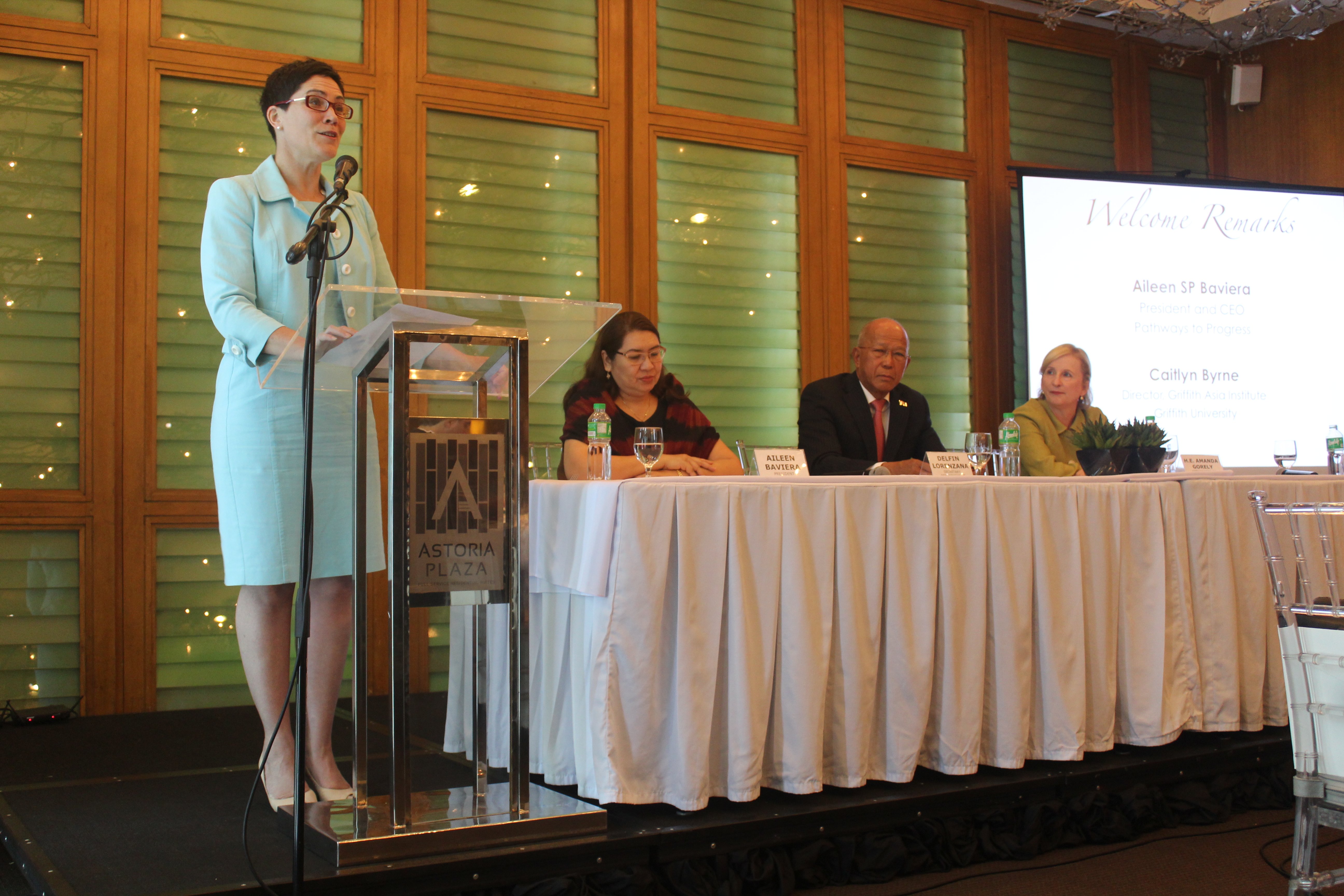Dear Friends and Partners,
We invite you to check and make use of our latest website feature, Chronalysis. Chronalysis is a quarterly round-up of regional issues and events that impact Philippine development and security, corresponding to the three new programs of Pathways to Progress. To view them, please follow the links below:
- Regional Security Architecture
- Regional Intergration and Connectivity
- Maritime Deveopment and Security
Also included in this newsletter are links to reports on the latest activities and commentaries uploaded on our website.
News and Events
Pathways to Progress Sends First Official Delegation to China
The foreign policy think tank Asia Pacific Pathways to Progress Foundation reached a major milestione last May when it organized its first official delegation to China. The group was headed by chairman of the board, former Secretary Raphael Lotilla. Other members included president Prof Aileen Baviera, fellows Dr. Jed Rabena, Dr. Gilbert Llanto, Dr. Jay Batongbacal, and research associates Florence Principe Gamboa and Grace Guiang.
Philippines, Australia Experts Explore New Areas Of Security Cooperation
In this photo (L-R) Griffith Asia Institute Director Caitlin Byrne, Pathways to Progress President and CEO Aileen Baviera, Defense Sec.Delfin Lorenzana, and Australian Ambassador Amanda Gorely.
PASIG CITY - Asia Pacific Pathways to Progress Foundation, Inc. and Griffith Asia Institute (GAI), with the support of the Australian Embassy in Manila and the Office of the Cabinet Secretary conducted the second Philippine-Australia Dialogue entitled, “Security Dimensions of Comprehensive Partnership”. The discussion convened academics and experts from the Philippines and Australia to discuss regional security trends, maritime security and cooperation, counterterrorism, cybersecurity challenges and implications of Australia’s foreign policy white paper. Defense Secretary Delfin Lorenzana delivered the keynote address.
PH-China relations, economic belts discussed during Beijing scholars’ visit to Manila
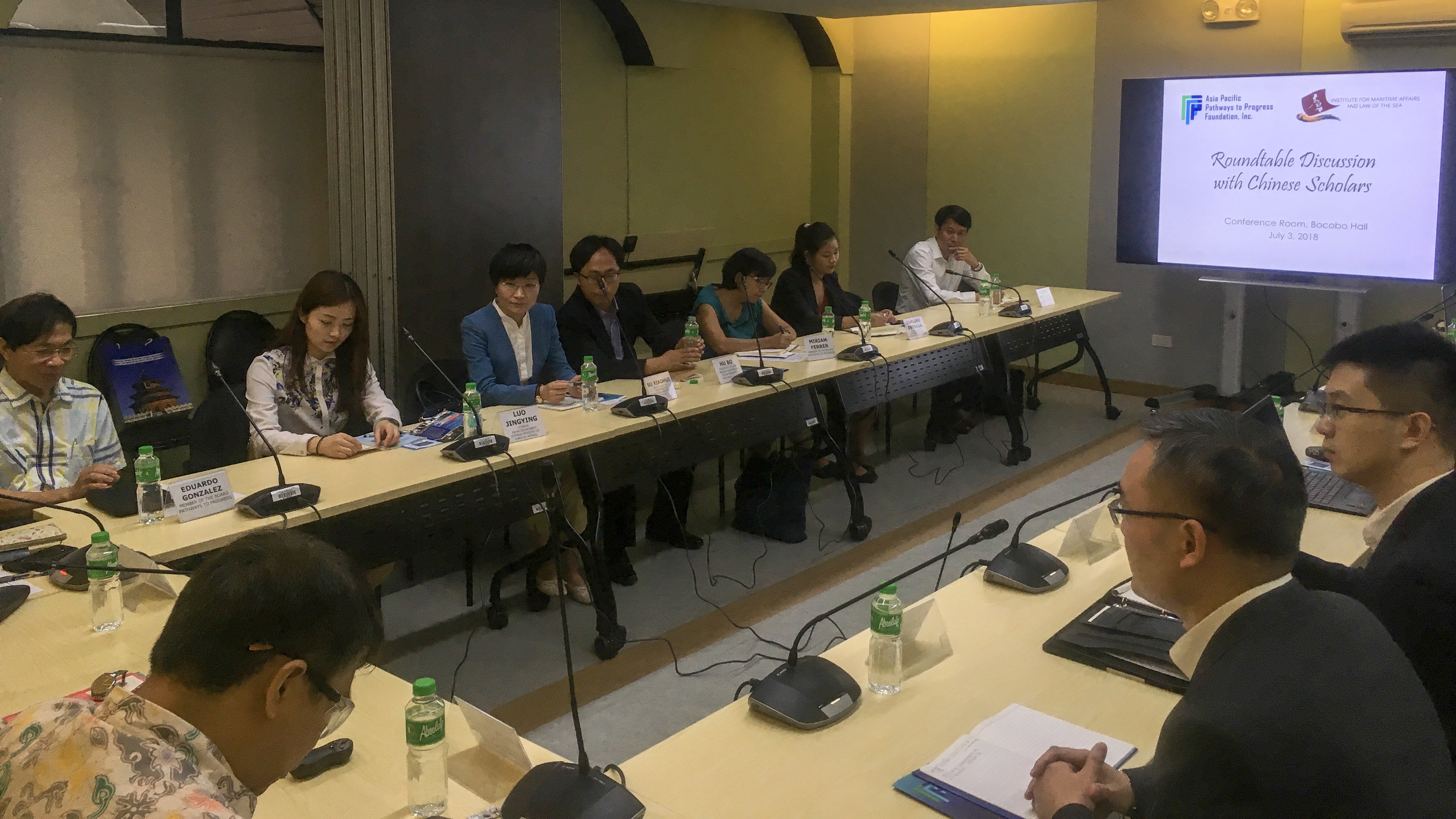
Early in July, a delegation of Chinese scholars visited Manila as part of a Belt and Road public diplomacy series in Southeast Asian countries. A roundtable discussion with Philippine scholars was convened to provide an opportunity to learn from each other’s perspectives.
As the lead discussant, Professor Wang Yiwei, Director of the Institute of International Affairs at Renmin University, presented the goals, components, and development of the Belt and Road Initiative; and stressed mutual connectivity as the key for today’s comparative advantage. He also addressed common concerns that are raised about BRI such as environment degradation, debt imperialism, transparency, issues of social responsibility, and whether it is rules-based or development-oriented.
Roundtable Discussion on US-China Trade War: “Mapping the Implications of Sino-US Economic War on the Philippines and ASEAN”

Last May 11, Pathways to Progress held a Roundtable Discussion on the issue of a looming US-China Trade War, at the Astoria Plaza in Pasig City. The event titled “Mapping the Implications of Sino-US Economic War on the Philippines and ASEAN” gathered economists, academics, and representatives from the relevant government agencies such as the National Economic and Development Authority (NEDA) and Department of Foreign Affairs (DFA).
Dr. Federico Macaranas, former Executive Director of the AIM Policy Center; Dr. Ronald Mendoza, Dean of the Ateneo School of Government; and Prof. Ellen Palanca formerly of the Ateneo School of Economics gave presentations.
Learning from China’s Fintech, E-commerce Breakthroughs
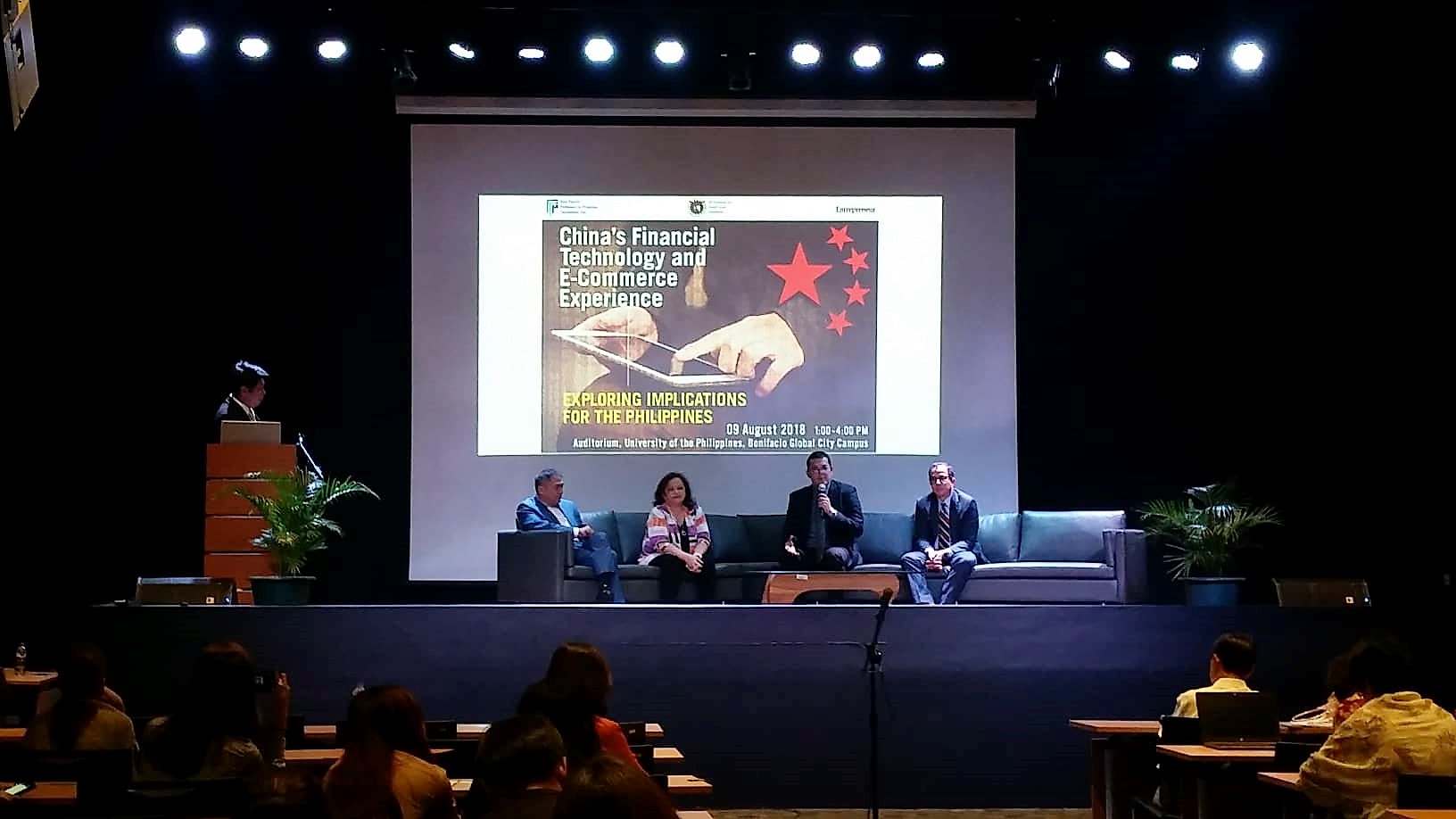
Financial technology and e-commerce have become global phenomena and China is leading the digital revolution. Last 9 August 2018, the forum China’s Fintech and E-commerce Experience: Exploring Implications for the Philippines brought together four distinguished speakers to share their stories and expertise on China’s digital lifestyle, and to speak about emerging trends and how the Philippines can learn from its neighbor’s advances.
Pathways to Progress meets with a delegation from CSIS
Asia Pacific Pathways to Progress met with a visiting delegation from the Washington, D.C.-based think tank Center for Strategic and International Studies (CSIS) for an exchange of views on U.S.’ Indo-Pacific strategy. CSIS was represented by China/Southeast Asia experts Bonnie Glaser, Derek Mitchell, and Scott Kennedy. The participants explored topics such as different interpretations of “Indo-Pacific”, US commitment to the region, and possible impact on the Philippines and the neighborhood.
Roundtable Conference On The Situation On The Korean Peninsula
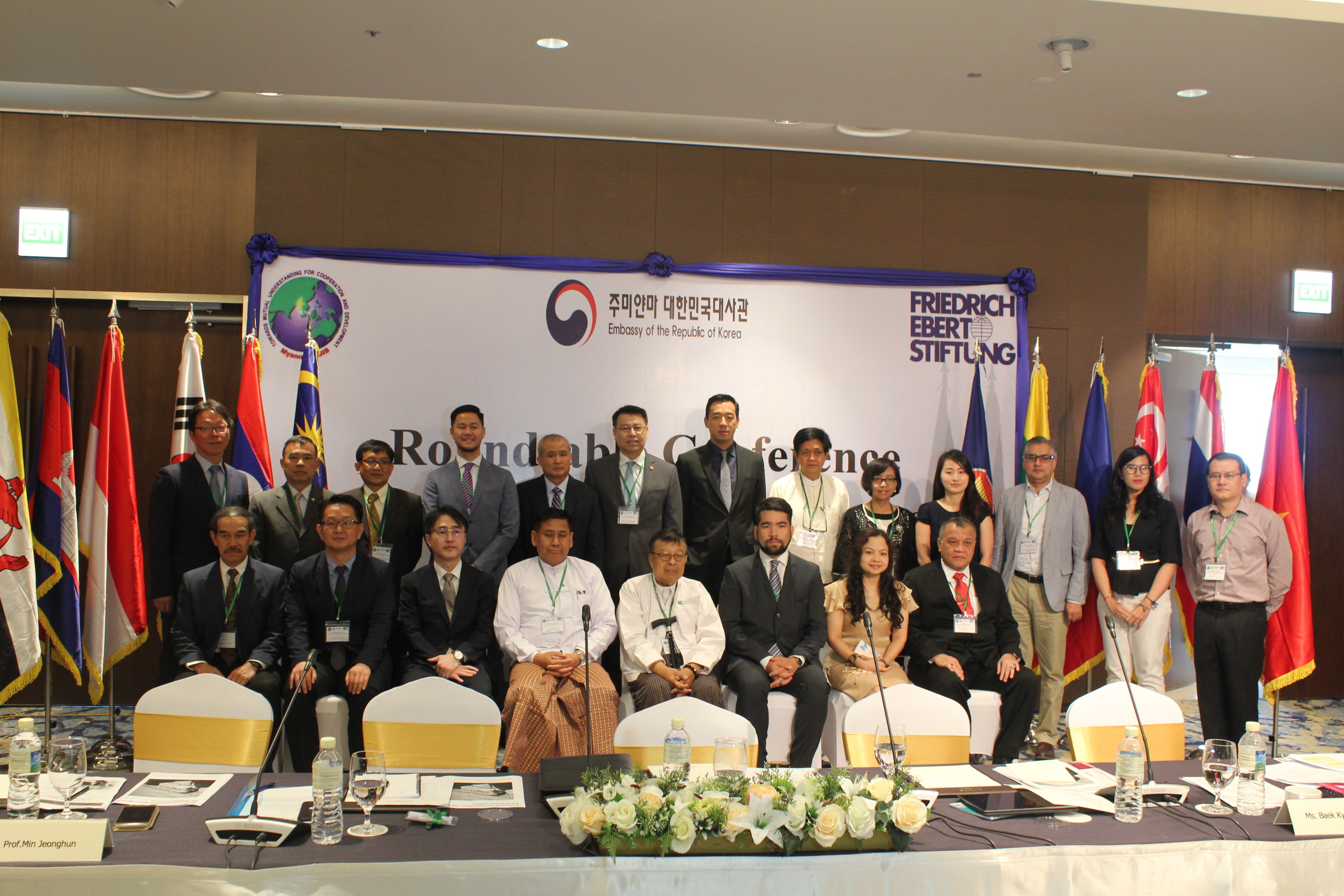
Roundtable Discussion with China specialists from University of Tokyo

Asia Pacific Pathways to Progress, together with UP Center for Integrative and Development Studies Strategic Studies Program, held a closed-door discussion with China specialists from University of Tokyo. Professor Herman Kraft and Mr. Julio Amador III moderated discussion. Pathways to Progress fellows and the delegates explored various topics including domestic politics of Southeast Asian countries and its implications on their respective foreign policies, cooperation with Japan, and other evolving challenges/opportunities in the region.
Activities of Dr. Wilfrido V. Villacorta as Trustee
Dr. Wilfrido Villacorta completed his three-month Visiting Research Fellowship at the Center for Southeast Asia Studies (CSEAS) of Kyoto University. His counterpart professor was Professor Caroline Sy-Hau. He conducted interviews with policy-makers, experts, diplomats and academics. He visited leading think tanks, including the Japan Institute of International Affairs (JIIA), where he spoke in a roundtable discussion on ASEAN’s relations with China and Japan on 13 June 2018. He was invited for the second time to speak at the World Peace Forum (WPF), co-sponsored in Beijing by Tsinghua University and the Chinese People’s Institute of Foreign Affairs on 14-15 July. He represented APPFI.
In Manila, he accompanied the visiting Japanese Sinologists to the Filipino-Chinese Museum on 29 August 2018, and met with Prof. Teresita Ang-See. On 11 September, he presided over the APPFI meeting with the delegation of the Shanghai Academy of Social Sciences led by Professor Sun Fuqing, Director of the Academy’s Institute of Applied Economics.
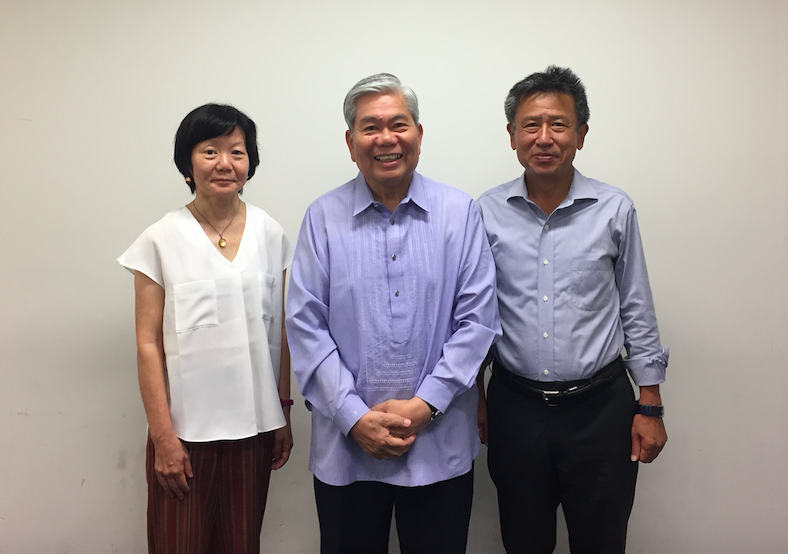
Dr. Villacorta with Professor Yoko Hayami, CSEAS Director , and Kyoto University Vice-President Yasuyuki Kono.
Commentaries
The Philippines Internal War Over the South China Sea: Idealists vs Realists
Mark J. Valencia
A recent poll purports to show that there is huge domestic opposition to Philippine President Rodrigo Duterte’s ‘soft’ approach to China, and it is supposedly gathering steam. If this is an accurate assessment of the ‘will of the majority’ –and some say it is not--it could force a policy change. But what are the proposed alternatives and the likely results of implementing them?
The Philippines, under then President Benigno Aquino, brought the legal issues generated by China’s competing claims in the South China Sea before an international arbitration panel set up under the auspices of the UN Convention on the Law of the Sea (UNCLOS). In July 2016, the panel ruled overwhelmingly in the Philippines’ favor.
Myth-Busting Chinese FDI in the Philippines
Alvin A. Camba
In October 2016, President Rodrigo Duterte’s visit to China brought an earmarked $24 billion worth of Chinese foreign direct investment (FDI) and overseas development aid (ODA) for the Philippines. After signing the memoranda of understanding (MOUs), both supporters and detractors of the deal expected an uptick in Chinese investments and an expanded role for Chinese state-oriented enterprises (SOEs).
A year and a half later, newspapers have argued that the predicted boom has failed to materialize. Indeed, the prevailing media narrative is that China encouraged the Duterte administration to concede the South China Sea in exchange for an investment boom that has yet to come. While this perspective may have some merit, the point that Chinese investments have barely increased is simply untrue. According to actualized FDI data of the Central Bank of the Philippines, which is recorded by examining bank deposits and conducting surveys with investors, China and Hong Kong’s FDI inflows had already reached $1.04 billion by March 2018. This amount has surpassed the entirety of Chinese and Hong Kong investment received under President Gloria Arroyo ($828 million) and already reached five-sixths of the $1.2 billion under Benigno Aquino’s term.
The continental shelf, the exclusive economic zone, the Philippine Rise, they are not Philippine territory: Comments on the National Territory Provision
Atty. Julius Yano

Image Credit: Philippine National Mapping and Resource Information Authority. Published in Bautista, Lowell. 'Philippine territorial boundaries: internal tensions, colonial baggage, ambivalent conformity' (2011) 16 (December) Journal of Southeast Asian Studies 35-53.
The Consultative Committee has presented to President Rodrigo R. Duterte the Draft Federal Constitution. Below are some comments that may be made in respect of the provision on National Territory contained in the draft which has been released online.
Lessons for Manila from Sri Lanka’s “debt-trap” experience
Darren Lim and Victor Ferguson
In recent months there has been significant debate regarding the merits of Chinese infrastructure financing. Chairman Xi Jinping’s signature Belt and Road Initiative (BRI) promises to reshape Eurasia and cement China’s great power status. But despite an obvious needed for infrastructure investment in the region, the downsides of such rapid and large financial flows are becoming apparent, posing a tricky challenge for debtor governments in balancing the significant opportunities against equally large risks.
As part of a broader trend towards warmer ties, Manila has increasingly looked to Beijing to fund the Duterte administration’s signature USD $180 billion ‘Build, Build, Build’ spending program designed to overhaul the nation’s infrastructure. China has proven a willing lender, offering more than $7.3 billion in financing for major projects including the USD $3 billion southern line of the North-South Railway, USD $374 million Kaliwa Dam Project in Quezon province, and USD $53.6 million Chico River Pump Irrigation Project among others. However, this assistance has not come without controversy.
The 2017 Australian Foreign Policy White Paper: A Critique
Charmaine Misalucha-Willoughby
In 2017, Australia released its Foreign Policy White Paper, which offers a comprehensive framework to uphold Australia’s security and prosperity. It reiterates the country’s commitment to continue engaging its partners and as such, is hinged on an outward-looking perspective and a preference for a rules-based region. This overarching thrust is concretized in five objectives: to promote an open, inclusive, and prosperous Indo-Pacific, to create business opportunities and stand against protectionism, to ensure the safety of Australians, to promote and protect international rules, and to step up support for the Pacific countries.
Japan and the BRI: a secondary power’s quandary
Grace Guiang, 31 May 2018
Recent decades have seen how the trend of infrastructure connectivity programs has evolved in developing regions, with each program being seen as either complementary or competing with another. A powerful state like China that has the technical capability and financial resources to pledge assistance has boldly presented a master plan, while smaller states participate individually in these economic connections offered by the big players, or come together as a regional bloc to make their own (i.e., ASEAN Connectivity, Asia-Africa Growth Corridor). ASEAN has a master plan for connectivity, for instance, that has long been cascaded to the national level, but as developing states, its member countries are challenged by the lack of financial capital, technology, and expertise to build infrastructure and thus need help from others, particularly fund-provider states and multinational banks.

Illustration by Liu Rui, Global Times
Quiet but active: Philippine independent foreign policy unpacked
Lucio Blanco Pitlo III
During the briefing given by the National Task Force on the West Philippine Sea (NTF-WPS) to members of Congress last May 30, 2018, senior government officials led by National Security Adviser Hermogenes Esperon, Secretary of Foreign Affairs Allan Peter Cayetano and Secretary of National Defense Delfin Lorenzana shed more light on the evolving Philippine foreign policy. The hearing revealed how inadequate the country’s diplomatic resources are in terms of dealing with China (i.e. no dedicated China desk, understaffed Asia-Pacific desk), as well as the challenges and opportunities posed by China’s rise for the Philippines. The need to develop a think-tank to focus on the myriad WPS issues was also raised to provide government with research-based policy recommendations. I focus my analysis on what I consider as the three main takeaways from the two-and-a-half-hour public hearing, namely: 1) accomplishments made by government in WPS since assuming office in 2016; 2) preference for a quiet approach in asserting Philippine position and; 3) appreciation of the broader geopolitical context.
Presentations
A View From Tomorrowland: China's Way of Life and Lessons for the Philippines
Atty. Ira Paulo Pozon
Presented by Atty. Ira Paulo Pozon at a forum titled "China's Financial Technology and E-Commerce Experience" held on August 9, 2018 at the University of the Philippines' Bonifacio Global City Campus, Taguig City. The forum was organized by Asia Pacific Pathways to Progress and UP Institute for Small-Scale Industries, with Entrepreneur Philippines as the media partner.
Atty. Pozon is a Philippine-qualified lawyer with an appreciation of the unique synergistic relationship that business and public policy have with the law. Having a Juris Doctor degree from a Civil law country and a Masters of Law from a Common law country, Ira has a distinctive appreciation of both legal systems. From the time he was admitted to the Philippine bar, Ira served as Legal Counsel to the then Vice President of the Republic of the Philippines. In that capacity he dealt with high-level executive policy and legal issues on both domestic and international fronts. He also served in other concurrent roles, focusing more on enhancing international and foreign relations, and on more managerial capacities. Ira is the only Filipino for the incoming batch of the 2018 AsiaGlobal Fellows Program of the University of Hong Kong. His research will focus on the impact of disruptive technologies, such as ride-hailing applications, and the means by which policy and law should adapt to this continuously evolving business landscape.
Learning and Earning from Digital China
Alfonso A. De Dios
Presented by Alfonso A. De Dios at a forum titled "China's Financial Technology and E-Commerce Experience" held on August 9, 2018 at the University of the Philippines' Bonifacio Global City Campus, Taguig City. The forum was organized by Asia Pacific Pathways to Progress and UP Institute for Small-Scale Industries, with Entrepreneur Philippines as the media partner.
Alfonso A. De Dios has 25 years of experience in Marketing Communications. He is the CEO and co-founder of TVCXpress Manila, the Philippines’ first digital, end-to-end commercial video content transmission and multi-format archiving system, serving the Philippine advertising industry. He is the CEO and cofounder of Calyxta.com, a digital beauty care community and e-commerce platform in the Philippines.
Facilitating Cross-border E-Commerce Between the Philippines and China
Maria Lourdes Yaptinchay
Presented by Maria Lourdes Yaptinchay at a forum titled "China's Financial Technology and E-Commerce Experience" held on August 9, 2018 at University of the Philippines Bonifacio Global City Campus, Taguig City. The forum was organized by Asia Pacific Pathways to Progress and UP Institute for Small-Scale Industries with Entrepreneur Philippines as the media partner.
Maria Lourdes Yaptinchay is currently the Director of the Bureau of Trade and Industrial Policy Research (formerly Sector Planning Bureau and Office of Policy Research) of the Department of Trade and Industry in the Philippines.
Future of ASEAN-Japan-China Cooperation
Prof Wilfrido Villacorta
The world has changed. New institutions and actors have arisen, a new order is emerging. It is but to be expected that aging powers should resist and desperately cling on to what remains of their dominant standing. It is the fierce rivalry perpetuated by them that exacerbates the threat of global conflict and the human crisis. Obsessed with containment, deterrence, divide-and-rule policy and balance of power, most traditional powers are intent on recovering their colonial supremacy.
The New Southbound Policy and the Philippines
Herman Kraft
Presented by Prof. Herman Kraft during a closed-door discussion with Pathways to Progress and Center for Strategic and International Studies held on July 12, 2018 at Microtel UP Technohub, Quezon City.
The Philippines and Taiwan’s New Southbound Policy
Scott Kennedy
Presented by Scott Kennedy during a closed-door discussion with Pathways to Progress and Center for Strategic and International Studies held on July 12, 2018 at Microtel UP Technohub, Quezon City.
Scott Kennedy is the Deputy Director of the Freeman Chair in China Studies and Director of the Project on Chinese Business and Political Economy Center for Strategic & International Studies
Strategizing Taiwan's New Southbound Policy in the Philippines
Alan Hao Yang
Presented by Alan H. Yang during a closed-door discussion with Pathways to Progress and Center for Strategic and International Studies held on July 12, 2018 at Microtel UP Technohub, Quezon City.
Mr. Yang is the Executive Director of the Taiwan-ASEAN Exchange Foundation (TAEF), and the Center for Southeast Asian Studies at the National Chengchi University, Taiwan.

